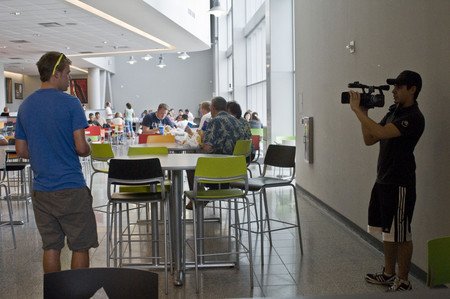UNLV film students dream about elusive fame, fortune amid recession
Daniel Jaidar is a 28-year-old UNLV film student with two bachelor's degrees and a stack of student loans.
"I should have been a doctor already," he said with a laugh.
But Jaidar's dream isn't medicine; it's movies. And if it was difficult to break into the film industry 10 years ago, it's almost impossible now, given the tight economic times.
"Breaking into Hollywood used to be a one in a million shot," he said. "I don't think (the odds are) that high anymore."
Unlike an engineering degree, which would qualify a graduate for work almost immediately, a film degree is an art degree, with the emphasis on "art," said Jaidar, who has degrees in English and film from the University of Nevada, Las Vegas.
"The English degree really didn't open any doors for me. And a film degree is worth nothing until you've had a record of success," he said.
Hollywood executives don't care if a filmmaker earned a doctorate or a high school equivalency. If they can make money on a film or screenplay, that person will be hired, he said.
Jaidar said that while a film school gives students access to equipment and instruction from experienced professors, there's no substitute for inherent, God-given talent. But he's afraid that even exceptional talent won't compensate for the shrinking pool of opportunities in these worsening financial times.
While the box office in Hollywood is still booming despite the recession, a combination of factors has made it much harder for new filmmakers to establish themselves in the business, said Geoff Alexander, a partner at 617 Management in Los Angeles.
Lack of financing outside the Hollywood studio system dried up when real estate-backed hedge funds lost 50 percent to 70 percent of their value, said Alexander, whose firm represents writers and produces material.
That placed more of the financial burden on the studios.
Although box office profits have been good, DVD sales are down.
And the studios' parent companies, such as Warner Bros., which is owned by Time Warner, haven't been as recession-proof as their filmmaking branches.
Less money equals cutbacks, and studios are now spending less on developing original material and more on surefire bets like comic book franchises and popular novels, Alexander said.
"They're (the studios) really looking for big movies to spend big money on, and you can only support so many big ones a year," he said. "The bad news for those trying to break in is that the studio mentality is: 'If you make a big movie, you get a big writer.'"
Although that mind-set is squeezing out newcomers, Jaidar doesn't blame Hollywood for taking fewer chances.
"The development guys (in Hollywood) are really risking their careers on projects," he said. "If you put your money on the wrong horse, that's it."
One of the ways new filmmakers attracted attention in Hollywood was by writing a great screenplay, finding an agent or a manager to represent it, and selling it to a studio.
But the number of original screenplays being purchased is at an all-time low, said Jason Scoggins, a manager at Protocol Entertainment in Los Angeles, a company that represents writers.
"Studios are buying (fewer) screenplays and paying less when they do," said Scoggins, who tracks the number of screenplays sold each month on his blog, the Scoggins Report.
Because the market is tight, Scoggins isn't looking for new clients anymore. With so many of his current clients struggling to find work, he must spend more time developing material with them.
"If you have 20 clients, and 15 clients are working, your workload is actually lower than if you have 15 clients, all of whom are not working," he said. "You have to help them keep their anxiety levels in check."
For Jaidar and his peers, such as UNLV film senior Adam Zielinski, this isn't good news.
"We know it's not going to be easy to get noticed," said Zielinski, 24. "But, hey, it's my dream. It has been since I was 16."
Zielinski and Jaidar, along with several other friends, have been writing scripts and making films for several years.
Zielinski is filming a series that's a fictional spoof of MTV's reality television show "The Real World." They intend to post the series on the Internet when it's completed.
"We're having a blast," he said. "And honestly, I'm not in a huge rush. I've got a lot to learn. (Steven) Spielberg didn't just walk in his first day and make 'Jaws,' right?"
If he's successful, Zielinski hopes he'll be able to have a few completed films and scripts to show agents and managers in Hollywood in about a year.
He already has had one film premiere at the CineVegas Film Festival, "Just Another Boy." The 400-seat theater was sold out for his screening, he said. "We soaked up that experience. It's the reason we do this."
Both Jaidar and Zielinski said Los Angeles is on their horizon.
When the economy picks up, Jaidar said he'll consider moving, but he won't go until he's ready.
"I don't really want to work as a waiter. And I'd rather make mistakes in my hometown, where I'm not paying $300,000 a month in rent," Jaidar said.
He could have left UNLV already -- and it's on his to-do list -- but he's putting it off for a little longer.
Why?
So he can take out even more student loans to pay for his films.
"A student loan costs a lot less than a bank loan," Jaidar said. "If I put all my film equipment on a credit card, there's a 12 percent interest rate. But on a student loan, you only pay 6 percent interest.
"It sounds like a terrible abuse of the system, I know. It's not conventional," he said.
But for those who love film and would do anything to break into the industry, conventional isn't in their vocabulary.
Contact reporter Mike Blasky at mblasky @reviewjournal.com or 702-383-0283.


















